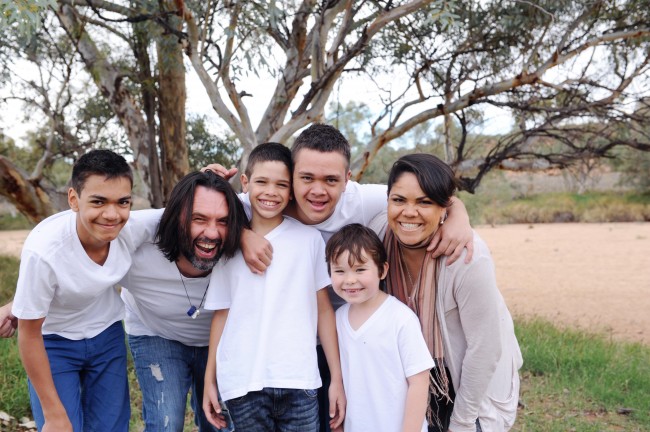
Jacinta Price and her family. As a mum she’ll be getting two of her sons who are eligible, vaccinated with the HPV vaccination.
Jacinta Price is a proud Warlpiri woman from Central Australia. The singer, television host, community advocate and mum to four boys, is now lending her support to spreading the word about the benefits of the Human Papillomavirus (HPV) vaccinations.
“I think any vaccine program is important and, being a mum, if we can prevent young Indigenous people from HPV-related cancers and disease later in life, then we are doing the right thing,” she says.
“I jumped at the opportunity to get behind the HPV vaccination campaign because all the work I do is promoting healthy living and health for Aboriginal people. As the host of Yamba’s Playtime [a television show for Indigenous children delivering health messages] I’m in a good position to give my voice to certain issues such as HPV prevention.”
Human Papillomavirus (HPV) is a common virus that affects young men and women. It can cause genital warts, cervical cancer and other cancers in women, and HPV-related cancers and genital warts in men. Vaccination against HPV can help protect young people from developing these cancers and disease later in life.
Vaccinations are currently being rolled out through schools, and will also be available through community health clinics in some remote areas.
Young Aboriginal and Torres Strait Islander men and women aged between 12 and 13 years can take part in a free national, vaccination program to protect against HPV, and there is also a catch up program for young men aged 14-15 years.
Jacinta has two sons who are eligible for the vaccines, a 13 and 15 year old. As a family, they’ve already talked about HPV and the vaccination program and will be going ahead with the full HPV vaccination program this year.
“I’ve already filled out the consent forms. I think the HPV vaccination program is wonderful for my kids because it stops cancers and disease in later life. If we start early with vaccinations like this, we can set them up for later in life. As a parent, I want to give them the best opportunity for their health,” Jacinta says.
“It’s also important for young Indigenous females as well because it prevents cervical cancer. There are higher incidences of HPV-related cancers, such as cervical cancer, in Aboriginal and Torres Strait Islander communities and the percentage of fully immunised Aboriginal and Torres Strait Islander women is also likely to be lower than average.”
“Indigenous parents should find out more about the free HPV vaccination program. They should have received an information pack from schools, and they can also visit the HPV website, www.australia.gov.au/hpv, where there are specific resources for Indigenous people, including in various languages.”
“It’s also important for young Indigenous people to get the full three doses of the HPV vaccine for full protection against cancers and disease later in life. I’d urge parents to get on the internet and look that page up, and there’ll also be information available through schools and community health clinics. Or people can talk to their local doctor or community nurse.”
The free HPV vaccine is available through schools, and will also be available through community health clinics in some remote areas. If a child’s education is not school-based (such as for those undertaking online studies), parents and guardians can contact their local health department for advice on where to get the vaccine. For more information, visit www.australia.gov.au/hpv
Comments are closed.